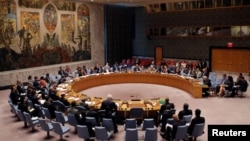The U.N. Security Council is expected to vote Wednesday on new and tighter sanctions to choke off funding to North Korea’s illicit nuclear and ballistic missile programs.
The United States and China have been negotiating the new measures since shortly after Pyongyang’s September 9 nuclear test. All 15 council members are now considering the draft text.
Most significantly, if adopted, the resolution will target North Korea’s coal export industry, which according to global trade figures is expected to generate more than $1 billion in revenue this year -- much of it believed to be used to finance its nuclear and ballistic missile programs.
“This resolution imposes a hard, binding cap that will cut DPRK coal exports, which are the DPRK’s largest single source of external revenue, by more than 60 percent,” said a U.S. official familiar with the text. That could add up to some $700 million per year, the official said.
Tightening Loopholes
Another proposed new measure would tighten the exemption in Resolution 2270, adopted unanimously in March, which banned the export of coal, iron and iron ore, unless such transactions were determined to be exclusively “for livelihood purposes” and unrelated to generating cash for Pyongyang’s illicit programs.
Some states had a “vague” and “liberal” interpretation of that clause, the U.S. official said, which allowed coal exports to remain at high levels. Under the new resolution, the livelihood definition would be narrowed to apply only to North Korean nationals.
“Much of this trade involves DPRK actors with links to the regime and its prohibited programs; so we are targeting a sector with a high proportion of bad actors,” the official said.
China is North Korea’s primary importer of coal. The Global Trade Atlas projects Beijing will import more than 20 million metric tons of the fuel source this year – up from just 3 million metric tons in 2009.
The proposed new sanctions also would ban export of certain metals – copper, nickel, silver and zinc – which bring in more than $100 million a year for the regime.
North Korea’s lucrative giant bronze statue making business also could be affected. The draft resolution would ban Pyongyang’s export of the figures, which are especially popular with African dictators, and generate tens of millions of dollars a year.
The proposed resolution would designate for travel bans and asset freezes 11 more North Korean officials and 10 entities involved in the nuclear and ballistic missile programs, as well as the DPRK coal and conventional arms trade.
Luxury goods, a favorite indulgence of North Korean leader Kim Jung Un, have been repeatedly targeted in previous U.N. resolutions. Under proposed new sanctions, carpets and tapestries worth more than $500 and fine china and porcelain tableware valued at more than $100 would be banned.
UN Security Council Likely to Impose New DPRK Sanctions This Week

UNITED NATIONS —



